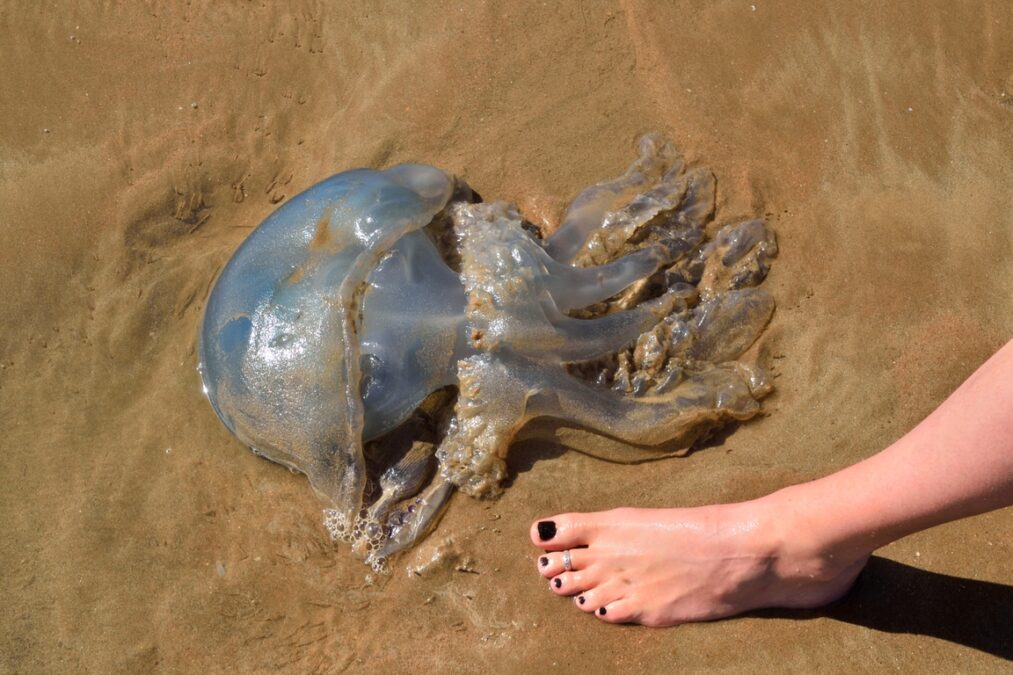Jellyfish are some of the most mesmerizing creatures of the ocean, drifting gracefully with the currents. Their translucent bodies and flowing tentacles inspire awe, but they are also equipped with specialized stinging cells called nematocysts. Many people wonder, can jellyfish sting each other, and under what circumstances these stings occur. Understanding this behavior is important not only for curiosity but also for marine biology research and safe human interactions with jellyfish in the wild.
While jellyfish are capable of stinging, they have evolved unique mechanisms to prevent harming their own kind. Accidental stings can happen when tentacles collide in dense swarms, but chemical cues and sensory adaptations usually prevent frequent stinging. Exploring the question of can jellyfish sting each other provides insight into their fascinating biology and survival strategies, which help maintain balance in ocean ecosystems.
Anatomy of a Jellyfish and How Stinging Works
Jellyfish have a remarkably simple anatomy, with a soft, bell-shaped body, no brain, and tentacles lined with nematocysts. These stinging cells are essentially tiny capsules filled with venom that discharge when triggered by touch or chemical signals. The nematocysts are highly effective for capturing prey, defending against predators, and deterring threats, making them a vital tool for survival.
Interestingly, nematocysts are not indiscriminate. They can distinguish between prey, predators, and other jellyfish of the same species. This selective firing explains why can jellyfish sting each other is a rare phenomenon. By understanding the structure and function of nematocysts, scientists can explain how jellyfish interact safely in large groups while still retaining their ability to hunt and defend themselves.
Can Jellyfish Sting Each Other?
Yes, jellyfish can sting each other, but such incidents are uncommon. Most stings between jellyfish occur accidentally in crowded waters or during predatory behavior when one species may consume another. Their stinging cells are designed to fire when triggered by external contact, but chemical recognition and sensory adaptations prevent them from harming conspecifics under normal circumstances.
For instance, the Lion’s Mane jellyfish is one species more likely to sting other jellyfish, usually when competing for food or during aggressive interactions. Observing jellyfish in the wild confirms that while stings between individuals can happen, they are rare, illustrating why the question can jellyfish sting each other remains an intriguing topic for marine biologists.
How Jellyfish Avoid Harming Each Other

Jellyfish use several fascinating adaptations to avoid harming each other. Chemical cues allow them to recognize members of their own species, reducing accidental stings in swarms or groups. Proprioception, the ability to sense their own body position, helps them navigate crowded waters, preventing tangling of tentacles and unnecessary stings.
Nematocysts also have highly specific triggers, meaning they rarely fire without the right stimulus. This adaptation ensures that jellyfish can coexist safely in large numbers while maintaining their predatory abilities. These biological mechanisms explain why can jellyfish sting each other is mostly limited to rare circumstances such as hunting or accidental contact.
Other Fascinating Facts About Jellyfish
Jellyfish are not only known for their stings but also for their remarkable longevity and adaptability. Some species, like the Turritopsis dohrnii, are considered “immortal” because they can revert to an earlier life stage and theoretically live indefinitely. While jellyfish lack brains, they can detect light, respond to touch, and exhibit simple decision-making behaviors, illustrating complex biological processes despite their simple anatomy.
Jellyfish can survive briefly out of water, although prolonged exposure is lethal. Some species can sting humans and even dogs, making caution essential when swimming in jellyfish-infested waters. Addressing questions such as can jellyfish sting each other alongside these fascinating facts gives a comprehensive understanding of their biology and ecological significance.
Common Myths and Curiosities About Jellyfish
Many myths surround jellyfish, adding to their mystique. Despite imaginative theories, jellyfish cannot time travel, but they are capable of surviving extreme conditions and adapting to environmental changes. Jellyfish kept as pets require specialized tanks and careful maintenance, demonstrating the delicate balance needed to sustain these creatures in captivity.
Other questions often asked include whether jellyfish can sting when dead or live for hundreds of years. While nematocysts can still sting after death for a short period, lifespans vary dramatically across species. Addressing these curiosities alongside the main question, can jellyfish sting each other, provides a full picture of their behaviors and the incredible adaptations that make jellyfish one of the ocean’s most captivating animals.
Conclusion
In conclusion, jellyfish are extraordinary creatures with the ability to sting, yet the question of can jellyfish sting each other shows that such events are rare and usually accidental. Chemical cues, proprioception, and specialized nematocysts prevent harm in most interactions. Understanding these behaviors not only satisfies curiosity but also highlights the complex and delicate nature of marine life, encouraging safe observation and appreciation of these unique animals.
FAQs
Can jellyfish sting each other?
Yes, but it is rare and usually occurs during hunting or accidental tentacle contact.
Can jellyfish live forever?
Some species, like Turritopsis dohrnii, can revert to an earlier life stage, potentially living indefinitely.
Can jellyfish see?
Jellyfish can detect light and shadows, though they do not have eyes like humans.
Can jellyfish sting when dead?
Yes, their nematocysts can remain active briefly after death.
Can jellyfish survive out of water?
Only for a short period; extended exposure to air is fatal.
Can jellyfish kill humans?
Certain species, like box jellyfish, are extremely dangerous and potentially lethal.
How long can jellyfish live?
Lifespan varies from months to decades, depending on the species.
Can jellyfish sting dogs?
Yes, dogs swimming near jellyfish may get stung.
Can jellyfish be pets?
Yes, with specialized tanks and careful handling, jellyfish can be kept as pets.
How long can jellyfish hold their breath?
Jellyfish don’t have lungs, but they can survive in low-oxygen environments for a limited time.
You may also read: Cass County Interactive Map: Your Complete Guide to GIS, Property, and Local Resources

